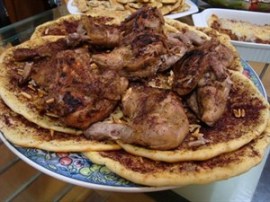MMMmmmmmm . . . It is only fitting that ‘M’ is for two of the most delicious meals offered in Jordan! While it is true that there are many delicious Arabic dishes that start with the letter M (check out Jim’s delicious post on Maqluube), these two are often at the top of the list as favorites.
Mansaf, the Jordanian national dish
Anyone who has traveled to Jordan, or even has read about traveling to Jordan has probably heard of Mansaf. A guidbeook section on Jordanian cuisine cannot be complete without mentioning this tasty meal. Even government websites extol the virtues of Mansaf. So (for the uninformed), what is Mansaf? It is lamb cooked till falling off the bone perfection, served over a bed of rice, topped with warm jameed (yoghurt sauce), sprinkled with pine nuts and/or almonds, and often accompanied by large pieces of shraak (Bedouin style flat bread).
At a restaurant, or I suppose in someone’s house, you might be served an individual serving on an individual plate. However, mansaf is traditionally served on a huge round serving dish, and is consumed as a communal meal straight from the platter. Traditionally, the platter is set on the floor and 10 or so people would sit around it and eat everything with their hands. This takes some getting used to for the uninitiated or cutlery-dependent, but really is not so bad once you get the hang of it. (The trick is rolling the rice into a ball around a core piece of chicken. Also, remember this has to be done only with the right hand as the left is considered unclean.)
Of course some Jordanians will offer you a plate and spoon or fork if you are visiting. But not all. And if you are able to try your best at eating with your hands without batting an eye … your status definitely goes up in the sight of your host. Once when I visited a bedouin village, I ate mansaf with my hands without hesitation. Later when I was walking around meeting people in the village my host told everyone, “he eats like us …. with his hands!”
You say Musakhan, I say Msakhan
Another delicious dish starts with ‘m’ but after that there everyone seems to disagree how to spell the word in English. There are a handful of variants … but they all spell one thing in my book … delicious! Now I must say from the outset that msakhan, although very popular in Jordan, is actually of Palestinian origin. But seeing as how 40-60% of the population are Palestinian or of Palestinian background, msakhan remains a crowd pleaser here in Jordan.
And really, what’s not to like? Msakhan consists of carmelized onions, warm bread, and chicken cooked to perfection. First a ton of onions are cooked in olive oil with a citrusy but purple spice known as sumac. Then a layer of flatbread is arranged on a platter. Some of the onion mixture is ladled over the bread, then the chicken is placed down, and often more onion mix and more bread. The whole thing is cooked in an oven and the result is … soooo very good!
The chicken and the bread are often both crispy on the outside and moist and delicious on the inside. The onion mixture bakes onto the bread creating a on-of -a-kind crust that is really hard to stop eating. As with Mansaf pine nuts or almonds are usually sprinkled over the finished product. It too is often served on a large communal platter and of the two dishes is by far the easier to eat sans utensils.
In Conclusion
Both meals are quite heavy and not for the faint of heart. You will probably not be doing your cholesterol any favors, especially with msakhan. But if you have an opportunity to experience either one … you must! Beyond tasting great, both of these dishes hold a special place in Jordanian and Palestinian culture. One is a source of national pride and hearkens back to the country’s Bedouin roots. The other is like Middle Eastern soul food that reminds many of grandma’s kitchen and table.
So the real question is … which do you prefer? Answer the poll below and let us know!
Filed under: Food, travel | Tagged: A to Z, A to Z Challenge, Bedouin Culture, Food, mansaf, msakhan, Poll, travel | 5 Comments »








